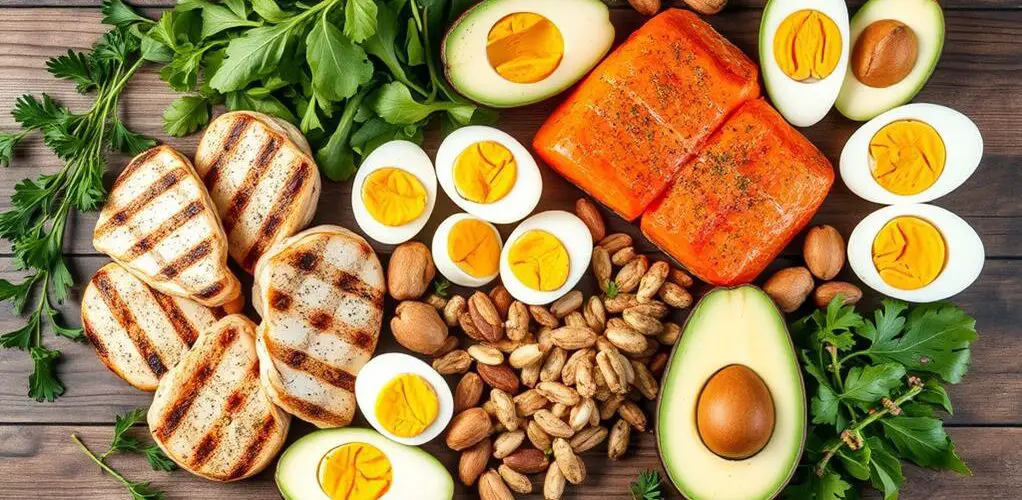
Choosing the best protein sources for a keto diet can be a tasty adventure! Start with seafood like shrimp and salmon, which are not only delicious but also packed with protein and heart-healthy omega-3s. Meat and poultry, such as chicken breast and grass-fed beef, offer zero carbs and high protein to keep you strong. Don't forget eggs; they're nutrient powerhouses with antioxidants galore! Add cheese, Greek yogurt, and cottage cheese for variety. Nuts and seeds bring protein and healthy fats, while tofu, tempeh, and edamame are fantastic plant-based options. Craving more? There's plenty more mouth-watering info ahead!
Key Takeaways
- Seafood: Shrimp and crabs have zero carbs, and fatty fish like salmon are rich in protein and omega-3 fatty acids.
- Meat and Poultry: Chicken breast and ground turkey provide high-quality, carb-free protein essential for muscle maintenance.
- Eggs: Each large egg contains less than 1 gram of carbs and 6 grams of high-quality protein, perfect for keto.
- Dairy Products: Cheddar cheese, plain Greek yogurt, and full-fat cottage cheese offer low-carb, high-protein options.
- Nuts and Seeds: Almonds, chia seeds, and pumpkin seeds are nutrient-dense, providing protein, healthy fats, and fiber.
Seafood
Seafood is a highly suitable protein source for individuals following the keto diet due to its low carbohydrate content and rich nutrient profile. Shrimp and most crabs contain zero carbs, making them perfect for keto meals.
Fatty fish like salmon and mackerel not only pack a protein punch but also come loaded with omega-3 fatty acids. These healthy fats are great for improving insulin sensitivity and heart health. Imagine getting nearly 20 grams of protein from just a 3-ounce serving of canned salmon, and guess what? It's entirely carb-free!
Seafood is a goldmine of nutrients that can boost brain health and help fend off chronic diseases. With B vitamins, potassium, and selenium, it's a powerhouse of goodness.
For those following a keto diet, hitting the recommended 8-10 ounces of seafood per week is a breeze. Plus, there are countless seafood recipes to keep your meals exciting and delicious.
Let's not forget the importance of sustainable fishing—choosing seafood caught responsibly guarantees that our oceans remain healthy and bountiful for generations to come.
Meat and Poultry
Delving into the world of meat and poultry offers keto dieters a wealth of carb-free, high-quality protein options essential for maintaining muscle mass. For those on a keto diet, fresh meat and poultry are indispensable.
Chicken breast, for instance, packs a punch with approximately 31.1 grams of protein per 3-ounce serving and zero carbs. This makes it a versatile and nutritious choice for keto meals, whether grilled, baked, or sautéed. Poultry preparation can be as simple or as creative as your culinary skills allow.
Not to be outdone, ground turkey brings 23.3 grams of protein per serving to the table, also with zero carbs. Perfect for meatballs, casseroles, and more, it's a lean option that fits seamlessly into any keto meal plan. Turkey sticks are a convenient on-the-go snack, offering about 10 grams of protein per serving—ideal for those busy days when you need a quick protein boost.
When it comes to beef varieties, grass-fed options are highly recommended. They're rich in omega-3 fatty acids and beneficial CLA, supporting overall health while fitting the keto framework.
From juicy steaks to hearty ground beef, the options are endless and delicious.
Eggs
Eggs stand out as another exemplary protein source for those adhering to a keto diet, complementing the rich array of options found in meat and poultry. Each large egg packs less than 1 gram of carbohydrates and about 6 grams of high-quality protein, making it a perfect fit for keto enthusiasts.
But that's just the beginning. Eggs are nutrient powerhouses, loaded with essentials like B12, selenium, and vitamin A, all of which are vital for your overall health.
One of the coolest things about eggs is how they help you feel full. They release hormones that control your appetite, which is super helpful on a low-carb diet. Plus, the yolks are high in antioxidants, which are great for your eyes and overall nutrient intake.
Worried about cholesterol? Most research suggests that eating whole eggs doesn't increase the risk of heart disease for most people.
You can enjoy eggs in many ways—whether scrambled, poached, or boiled, the cooking methods are endless. The variety includes everything from classic chicken eggs to duck and quail eggs. Each type brings a unique flavor and texture, so you'll never get bored.
Dairy Products
When it comes to adhering to a keto diet, dairy products emerge as an excellent protein source due to their low carbohydrate and high-fat content. One of the standout choices is cheddar cheese, which contains only 1 gram of carbs per ounce. This makes it perfect for those looking to maintain ketosis while enjoying delicious meals.
The cheese health advantages extend beyond just low carbs; regular consumption can help reduce muscle mass loss as we age and offer cardiovascular benefits.
Another great option is plain Greek yogurt. Though it has about 4 grams of carbs per 100 grams, it provides a robust 10 grams of protein, making the keto yogurt benefits quite substantial. It's a tasty snack that helps keep you full and satisfied while sticking to your diet plan.
Full-fat cottage cheese is another filling choice, offering 23.5 grams of protein and 10.8 grams of carbs per cup. It's a versatile ingredient that can be included in various dishes.
Additionally, cream and half-and-half are popular in many keto recipes. Heavy cream, in particular, has less than 1 gram of carbs per tablespoon and adds a rich, creamy flavor to any dish.
Nuts and Seeds
Beyond dairy products, another valuable category of protein sources on a keto diet includes nuts and seeds. These tiny powerhouses are packed with nutrient density, providing healthy fats, protein, and fiber while keeping carbs to a minimum. Let's explore some great options.
Almonds, for example, offer about 6 grams of protein and just 2.5 grams of net carbs per ounce. They are a fantastic snack idea, perfect for munching on the go or adding a crunchy texture to salads and recipes.
Chia seeds are another gem, boasting 5 grams of protein and only 1 gram of net carbs per ounce. Plus, they are rich in omega-3 fatty acids, which are great for heart health. Sprinkle them on yogurt or blend them into smoothies for an easy nutrient boost.
Pumpkin seeds also shine with 7 grams of protein and 4 grams of net carbs per ounce. They're packed with iron and magnesium, making them a smart choice for a filling snack.
And don't forget about macadamia nuts! With just 2 grams of net carbs and around 2 grams of protein per ounce, they are an ultra keto-friendly snack option.
Plant-Based Proteins
Plant-based proteins are fantastic for keto diets, especially with options like tofu, which packs a punch with 8.67 grams of protein and just 1.55 grams of carbs per 3-ounce serving.
Tempeh is another superstar, offering a whopping 19.9 grams of protein and 7.62 grams of carbs per 100 grams, making it perfect for vegan dishes.
Edamame is a powerhouse too, with 18.5 grams of protein and 13.8 grams of carbs per cup, plus it's high in fiber to help you feel full.
Nutrient-Rich Tofu Benefits
Tofu stands out as a nutrient-dense plant-based protein source, particularly suitable for those following a ketogenic diet. With approximately 8.67 grams of protein and only 1.55 grams of carbs per 3-ounce serving, tofu fits well within the low-carb requirements of a keto regimen.
Additionally, tofu preparation is straightforward, making it a versatile ingredient for various dishes.
Tofu is not just about protein; it is also rich in essential minerals like calcium, manganese, and copper, all of which support bone health and overall well-being. These nutrients make it an excellent choice for those looking to maintain a balanced and nutrient-rich diet.
Furthermore, the healthy fats in tofu can help lower LDL cholesterol levels, which is beneficial for heart health.
Here are some notable benefits of incorporating tofu into your keto diet:
- Low-Calorie Count: With only 78.2 calories per 3-ounce serving, tofu allows for nutrient-dense meals without excessive caloric intake.
- Versatility in Dishes: Tofu can be added to stir-fries, soups, and salads, enhancing both flavor and nutritional value.
- Heart Health: The healthy fats in tofu contribute to lowering LDL cholesterol levels.
- Bone Health: Rich in calcium, manganese, and copper, tofu supports strong bones.
Exploring various tofu recipes can make your keto journey both delicious and nutritious.
Tempeh for Vegan Diets
After discussing the numerous advantages of incorporating tofu into a ketogenic diet, another excellent plant-based protein source to contemplate is tempeh.
Tempeh is a fermented soy product, packing about 19.9 grams of protein and only 7.62 grams of carbohydrates per 100-gram serving. This makes it a stellar high-protein, low-carb option for those on vegan diets.
One of the key tempeh benefits is its richness in dietary fiber, with around 7.6 grams per serving. This not only aids digestion but also helps you feel fuller for longer periods.
Tempeh is also brimming with essential nutrients like calcium, iron, and magnesium, contributing to overall health and well-being. The fermentation process of tempeh enhances the bioavailability of these nutrients and introduces probiotics, which can support gut health.
Now, let's talk cooking techniques. Tempeh's firm texture makes it incredibly versatile. You can marinate it, then use it in everything from stir-fries to salads. Its ability to absorb flavors makes it a culinary chameleon of sorts.
Edamame Protein Power
Edamame, the young green soybean, emerges as a potent protein source for those adhering to a ketogenic lifestyle. With approximately 18.5 grams of protein per cup, edamame provides a rich, plant-based protein option that fits well into keto diets.
It's also relatively low in carbs, offering about 13.8 grams per cup, making it suitable for a low-carb meal plan when eaten in moderation.
One of the key nutritional benefits of edamame is its high fiber content, which aids digestion and promotes feelings of fullness—crucial for anyone on a keto diet. This fiber content, combined with its protein, makes edamame a versatile addition to various edamame recipes such as salads, stir-fries, and even as a standalone snack.
Additionally, edamame is rich in essential amino acids, providing a complete protein profile that can complement other plant-based proteins. This green soybean also offers essential vitamins and minerals like folate, vitamin K, and iron, contributing to overall health on a keto diet.
Here are some ways to enjoy edamame:
- Salads: Toss into a fresh veggie salad for added protein.
- Stir-fries: Mix with low-carb vegetables for a quick meal.
- Snacks: Enjoy steamed edamame with a sprinkle of sea salt.
- Soups: Add to broths for an extra nutritional punch.
Frequently Asked Questions
What Keto Foods Are High in Protein?
High-protein keto foods include fatty fish, fresh meats, eggs, and dairy products. Additionally, keto protein powders and high-protein snacks such as nuts and seeds are excellent options to maintain protein intake while adhering to the keto diet.
What Foods Have Protein but No Carbs?
Foods rich in protein but devoid of carbs include seafood like shrimp and fish, fresh meats such as beef and chicken, and eggs. For plant-based options, tofu and tempeh serve as excellent protein-rich snacks.
How to Get 100G of Protein a Day Keto?
To achieve 100 grams of protein daily on a keto diet, integrate protein shake options and effective meal prep strategies. Include grilled chicken, cheddar cheese, Greek yogurt, whey protein isolate, beef jerky, eggs, and canned fish.
What Are the Top 10 Keto Foods?
The top 10 keto foods include fatty fish, eggs, cheese, meat, poultry, nuts, seeds, avocados, coconut oil, and leafy greens. These foods facilitate keto meal prep and offer protein-rich snacks essential for a balanced ketogenic diet.
Conclusion
To sum up, keto protein sources encompass a variety of options suitable for dietary preferences and needs. Seafood, meat, and poultry provide rich, high-quality proteins. Eggs and dairy products offer versatility and additional nutrients. Nuts and seeds contribute healthy fats and plant-based proteins. Finally, plant-based proteins serve as valuable alternatives for those seeking non-animal sources. Together, these options support a balanced, protein-rich keto diet essential for maintaining energy levels and overall health.
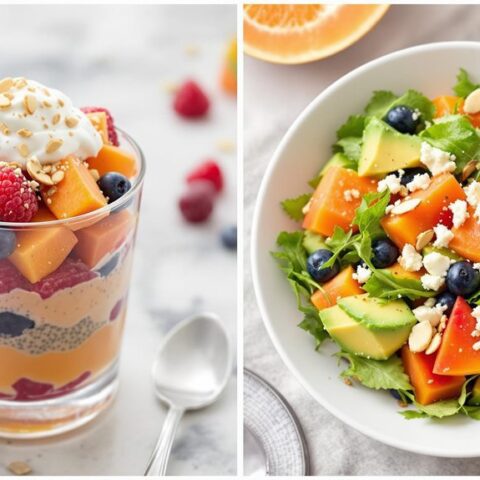

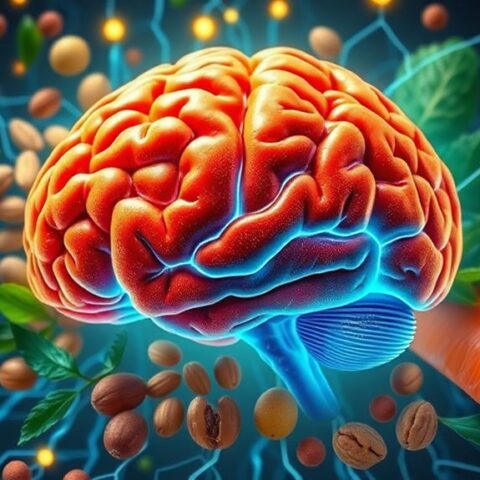
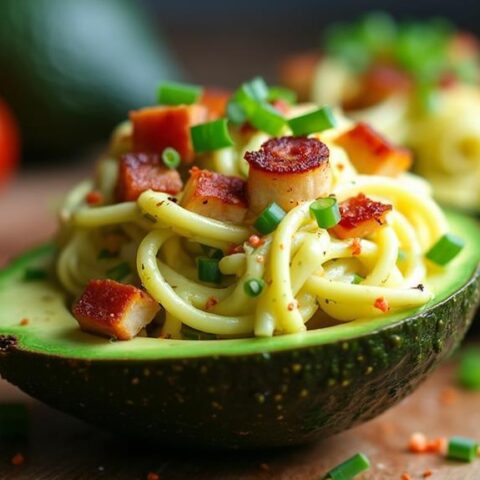
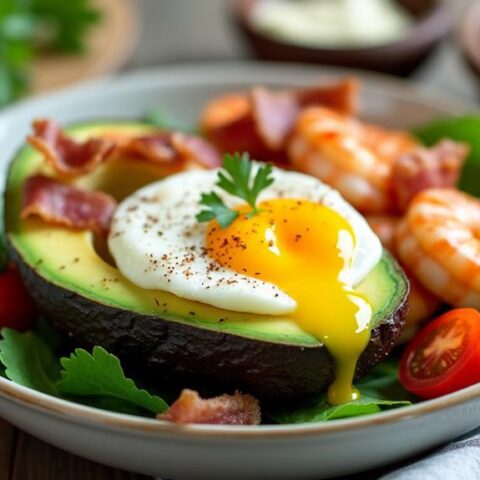
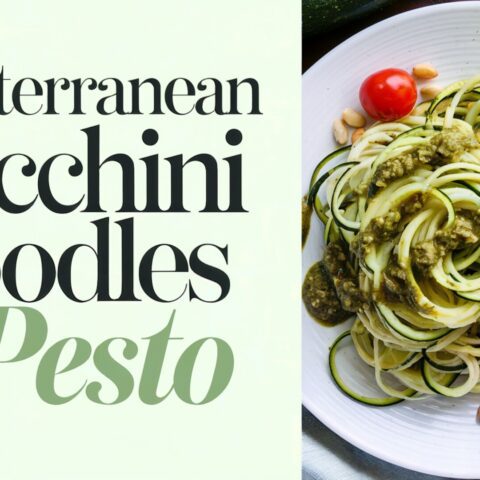




No Comments